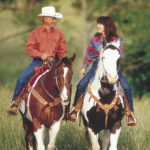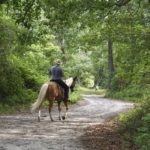Your horse may appreciate an affectionate pat for a job well done, but a tasty treat will go a lot further to reinforce desirable behavior and strengthen your bond with him.

Those are the findings of a French study comparing the effectiveness of food and ?grooming? rewards. Researchers at the University of Rennes used 20 horses between the ages of 1 and 2, who were kept in two herds and had little prior human contact.
In the first phase of the study, the horses were trained to stand still for an increasing length of time when given a vocal command. Half received a small piece of carrot when they complied; the other horses were rewarded with scratching on the withers. Training sessions were repeated three times a day for six days, and the maximum length of time each horse ultimately stood still was recorded.
In the second portion of the study, the researchers performed a ?motionless human? test: A person stood at the center of an empty arena, and each horse was allowed to approach and interact as he wished for five minutes. Researchers recorded how much time passed before the horse approached the person and how long he stood within half a meter (about one and a half feet).
The resulting data showed that horses who had been rewarded with food during training not only learned more quickly, verifying results of previous studies, but were also more attached to people after training ended. This second finding was new, say researchers, but not totally unexpected given the nonphysical relationship horses typically have with each other.
?Dogs [in contrast] have physical contact between social partners and overall react more strongly to human ?scratching? than horses,? explains Martine Hausberger, PhD. ?If you observe horse groups, you will find that proximity prevails and not direct contact.? Although there is some mutual grooming between horses, she adds, it appears relatively infrequently and related more to shedding times.
Although it’s tempting to interpret a horse’s willingness to approach a person as affection, researcher Carol Sankey, PhD, cautions against assuming that’s the case: ?The display of such behaviors toward us could indicate that horses perceive us as positive (something that in humans would be referred to as ?liking?). However, we have to remain careful when attributing such [human characteristics] to nonhuman animals.?
Sankey adds that as powerful as food rewards can be, they must be used wisely or horses may become too demanding: ?In our study, treats were given only after the horse correctly responded to the order.
Food rewards should not be confused with hand feeding, which outside the working context may indeed lead horses to become pushy. In the working context, horses get a treat only if they work well.?





